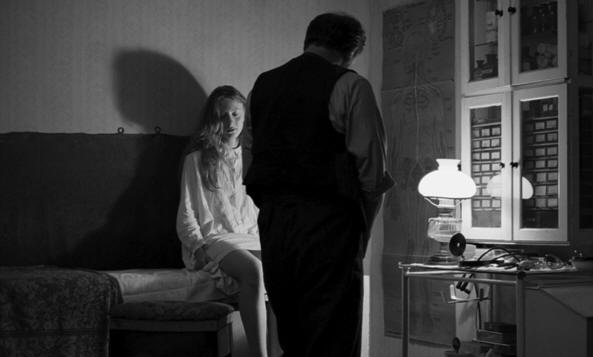
Friday, January 15, 2010
PHOTOS |
COMING SOON|
EXAMINER.COM FILM ARTICLES
||HOME
MOVIE REVIEW
The White Ribbon (Das Weiβe
Band)
In 1913 Pre-War Germany, A War Between Innocence
and Malevolence

Roxane Duran as Anna and Rainer Bock
as Anna's father The Doctor in Michael Haneke's epic drama "Das Weisse Band"
("The White Ribbon"), which expanded its release to San Francisco and other U.S.
cities today.
Sony Pictures Classics
By Omar P.L. Moore/PopcornReel.com
Friday, January 15, 2010
If there's such a thing as cerebral cruelty on the big
screen, then Michael Haneke is surely its master trafficker. Mr. Haneke
has often exercised the mental muscle of human malevolence and discomfort in his
films, whether internally in one character (in "The Piano Teacher"),
specifically in a targeted family (in "Caché") or universally among a community
in his latest drama, an instant classic entitled "Das Weiβe
Band" ("The White Ribbon").
In things good and bad, Mr. Haneke's characters are rife with the humanness of
contradiction, and the Austrian filmmaker astutely selects a black-and-white
canvas (beautifully lensed by Christian Berger) to render the complexities all
the more indelible, symbolic and devastating. Simply put, "The White
Ribbon" is chiefly effective thanks to its most vital and non-judgmental
character -- the camera, and what it doesn't reveal -- and by extension what it
allows us to infer and imagine. One of the most genteel horror films
around, Mr. Haneke's 2009 Palm D'Or-winning flick has all the grace, tragedy and
irony of a Douglas Sirk film, minus the emotion and warmth.
"The White Ribbon" calls our attention to the acts or non-acts of parents
projected onto their children. Set as a precursor to World War I in
Germany, the two-hour, 24-minute film tracks 36 characters in a small Protestant
village. The film's principal anchor is a polite schoolteacher (Christian
Friedel) who guides us with narrative help (supplied by Ernst Jacobi) through a
town full of secrets, mysteries and unrepentant sinners. Several incidents
occur, but who is behind them? Is it the larger society and its deafening
silence? The adults? The kids? The society prior to the onset
of Nazism? The silent majority? Inhumanity? Who is the enemy?
Is it us?
One of the film's most effective and essential episodes depicting the
alternating beauty and ugliness of the human heart involves two characters.
A tranquil moment between them affords a cheeky, subtle interaction that's funny
but as scary and riveting as anything we see during the entire film. This
moment is a testament to great acting, which "The White Ribbon" has an abundance
of. Just as telling, the camera often captures the film's most painful
scenes occurring in nature settings or areas generally regarded as safe havens,
thus evoking a stark, powerful dissonance between scene location and its
content. There's also biting dialogue of which Ingmar Bergman would be
proud, and very little music, for the behavior we merely glimpse plays all the
most discordant, disturbing and offbeat notes.
Mr. Haneke's script is drawn tightly, always forcing the viewer to ask moral or
even technical (filmmaking) questions about who is orchestrating what. The
camera often shows a male with his back to us, or a male restrained, obscured or
handicapped in some way, whether literally or figuratively. And in one
scene a child asks, "Why are you asking us? Talk to our parents." In
turn, we're never asked to assume that the parents in the film know more than
their kids; we instead constantly wonder whether they have they are
adults, let alone parents. There's a strange reversal of "Lord Of The
Flies" here, as it appears that the adults are the ones running humanity's train
right off its imperfect rails. Or are they?
(It's interesting to note that almost 100 years after the time of the film's
story, with all the unsavory stories today about some teachers behaving
illicitly and illegally with their students, that in Mr. Haneke's film a 1913
schoolteacher is presented as a pillar of righteousness. Perhaps today's
different world represents a plausible notion that the example of a teacher as a
figure of moral rectitude has long since been overrun.)
"The White Ribbon", which expanded to San Francisco and other local area
theaters today after a December 30 start in New York and Los Angeles, shows us
authority figures of supposed order and correctness: church leaders, doctors,
stewards, barons, midwives, farmers and tutors, all of whom may or may not have
committed or acquiesced to immoral acts. For this uncomfortable stage of
human developments in Germany Mr. Haneke doesn't have to use an impending menace
like Hitler as touch paper to light a fateful fuse; it is the decay in the
collective human heart that propels the far larger horrors to come. This
small-town wickedness is just one of the warm-up acts.
With: Leonie Bensch, Ulrich Tukur, Ursina Lardi, Fion Mutert, Michael Kranz,
Burghardt Klaussner, Steffi Kűhnert, Maria-Victoria Dragus, Josef Bierbichler,
Gabriela Maria Schmeide, Enno Trebs, Susanne Lothar, Branko Samarovski and
Birgit Minichmayr.
"The White Ribbon" (Das Weiβe Band)
is rated R by the Motion Picture
Association Of America for some disturbing content involving violence and
sexuality. The film's
running time is two hours and 24 minutes. The film is in black and white,
and in the German language, with English language subtitles.
SUBSCRIBE TO THE POPCORN REEL MOVIE REVIEWS - CLICK BANNER

PHOTOS |
COMING SOON|
EXAMINER.COM FILM ARTICLES
||HOME